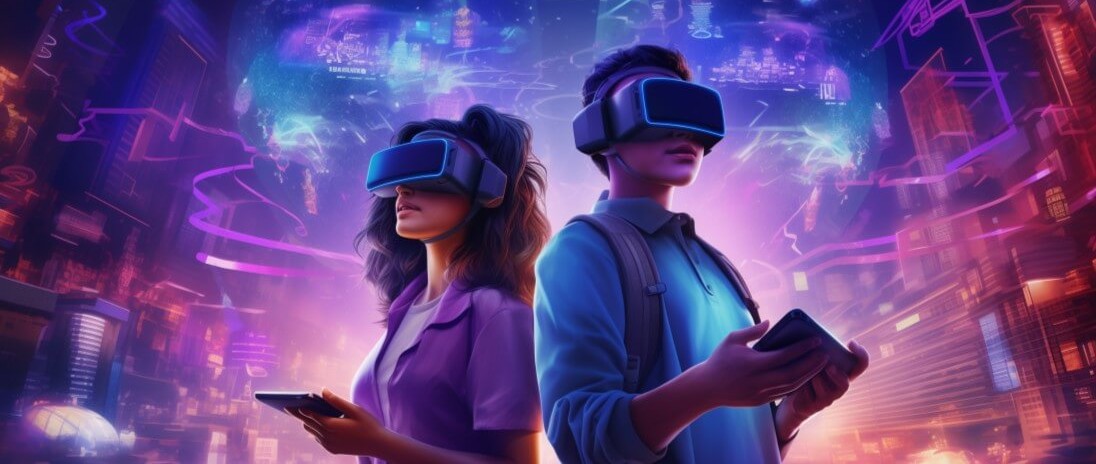
Unlocking the Potential: The Metaverse's Impact on Higher Education
Understanding the Metaverse
Before we delve into the metaverse's impact on higher education, let's briefly understand what the metaverse entails:
Definition: The metaverse is a three-dimensional, immersive digital space where individuals interact with a computer-generated environment, creating a seamless blend of physical and digital realities.
Evolution: Coined by Neal Stephenson in 1992, the metaverse has transitioned from science fiction to real-world applications, with major companies like Facebook (now Meta) heavily investing in its development [1].
The Rise of Metaversities
Metaversities represents a fusion of the metaverse and traditional universities, where students and faculty don VR headsets for synchronous classes on virtual campuses [2]. A pioneering effort involving 10 U.S. colleges and universities has leveraged partnerships with tech giants like Meta and virtual reality platforms to create 3D digital replicas of their campuses [1].
Meta's Commitment: Building "Metaversities"
Meta's $150 million commitment to building metaversities signifies a significant shift in how education is delivered and experienced. These metaversities, virtual replicas of real campuses, aim to enhance the learning environment by leveraging virtual reality (VR) and augmented reality (AR) [3]. The implications of this venture are far-reaching:
- Enhanced Learning Environments: Metaversities create engaging and lifelike study areas, removing physical barriers and enhancing e-learning programs [3].
- Immersive Experiences: Students can traverse remote locations, immerse themselves in historical events, and engage in hands-on training in a safe virtual environment [3].
- Affordability: Overcoming budget constraints, metaversities offer cost-effective alternatives, such as virtual cadavers for medical education [4].
Benefits of the Metaverse in Education
The metaverse introduces a paradigm shift in education, bringing forth several tangible benefits [4]:
- Affordability and Resource Access: Metaversities address budget constraints by providing cost-effective alternatives and increasing access to learning resources.
- Enhanced Student Performance: Virtual training in metaversities facilitates effective visualization and hands-on experiences, leading to increased engagement and academic achievement.
- Realistic Virtual Interactions: Metaverse technologies bridge the gap between real-life and virtual interactions, allowing for more natural and fluid communication.
- Experimentation with Hard-to-Create Phenomena: In fields where real-world experiments are challenging or risky, metaverse technologies enable immersive simulations, enhancing the learning experience.
- Increased Accessibility for Remote Students: Metaverse technologies can help bridge the gap between rural and urban education, making educational resources more accessible to remote students.
- Attraction for Young Demographics: The metaverse's appeal to younger generations, familiar with virtual reality technologies, can be leveraged to attract students to higher education.
Research Insights: Teaching in Virtual Reality
Research conducted by Stanford University sheds light on the impact of teaching in virtual reality (VR) environments [5]:
- Increased Comfort with Technology: Exposure to VR led to greater comfort not only with the technology itself but also among students, fostering improved interpersonal dynamics.
- Importance of Time: The research emphasized the role of time in VR education, indicating that increased exposure over time positively correlated with improved experiences.
- Recommendation for Practical Use: While VR remains a powerful medium, it is recommended to treat it as a source for field trips and practical experiences rather than the main infrastructure of a course.
Addressing Concerns and Challenges
Despite the promising potential of the metaverse in education, concerns and challenges loom [5]:
- Darker Possibilities: Dr. John Preston warns about the potential exploitation of instructors and the risk of further capitalization if lectures become intellectual property owned by tech companies.
- Accessibility Challenges: Dr. Nir Eisikovits raises concerns about a potential three-tiered system, with disparities in access based on financial means, exacerbating existing inequalities.
- Ownership and Surveillance: Questions about ownership of recorded lectures and the surveillance implications of using metaverse technologies in education pose challenges to academic freedom.
The Educator's Role in Metaverse Development
Dr. Kathy Hirsh-Pasek emphasizes the pivotal role educators should play in the development of metaverse technologies [5]:
- Active Involvement: Educators should be actively involved in decisions related to VR design to ensure the technology aligns with educational goals.
- Guides in the Learning Process: Learning is not a solo endeavor, and educators should serve as guides, facilitating active learning and allowing for variability in student responses.
- Preserving the Human Element: The metaverse should enhance, not replace, professors, preserving the human element in the learning experience.
Conclusion: Navigating the Educational Metaverse
As higher education steps into the metaverse, it is crucial to strike a balance between technological innovation and the preservation of core educational values. The metaverse offers unparalleled opportunities for engagement, accessibility, and innovation, but its successful integration requires thoughtful consideration of ethical, accessibility, and pedagogical considerations. As educators, institutions, and tech companies collaborate to navigate this uncharted territory, the metamorphosis of higher education in the metaverse unfolds.
In the journey toward the metaverse, education stands at the crossroads, presenting a unique opportunity to redefine how knowledge is imparted and acquired. The metaverse is not merely a technological advancement but a catalyst for a transformative educational experience, shaping the future of learning.
Notes and References
- Drozdowski, Mark J, Ed.D. . (2022, May 6). Higher Education in the Metaverse - Best Colleges. https://www.bestcolleges.com/news/analysis/2022/03/15/higher-education-in-the-metaverse/
- D’Agostino, S. (2022, August 02). College in the Metaverse Is Here. Is Higher Ed Ready? - Inside Higher Ed. https://insidehighered.com/news/2022/08/03/college-metaverse-here-higher-ed-ready
- Kshetri, N. (2022, August 23). Six Benefits That the Metaverse Offers to Colleges and Universities - Cengage Learning. https://www.cengagegroup.com/news/perspectives/2023/metaverse-higher-education/
- Metaversity: Bringing the Metaverse to Higher Education - The Conversation. https://theconversation.com/six-benefits-that-the-metaverse-offers-to-colleges-and-universities-188950
- Kelliher, R. (2022, June 09). What Could the Metaverse Mean for Higher Education? - Diverse Education. https://www.diverseeducation.com/institutions/article/15293003/what-could-the-metaverse-mean-for-higher-education
